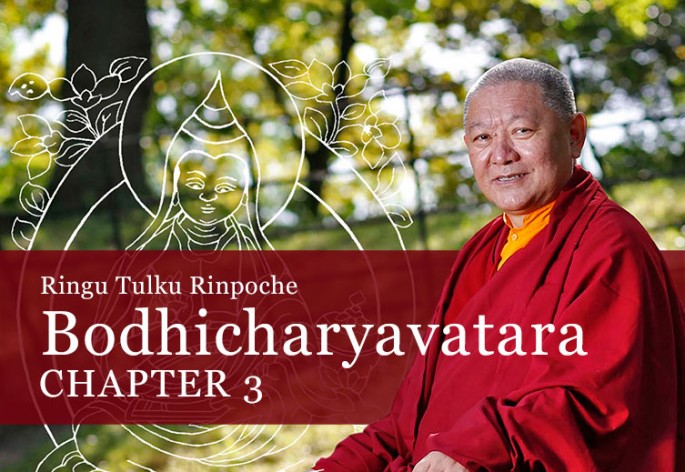BA3_13-17 Giving Away the Body
With video BA3_13-17, Rinpoche explains stanzas 13 to 17 of the third chapter of the Bodhicharyavatara. This section is about the special method of giving away our body.
To view the video, simply click on the image to view all the Chapter 3 videos.
If you prefer listening to the teaching in audio, use the audio player below.
The audio as well as the audio translations in different languages and the transcript of this teaching are all available on Chapter 3 page.
We are also studying the commentary transcript on Chapter 3, which you can download here and in the Library section. Further recommended reading: the commentary book by Kunzang Pelden (Khenpo Kunpal), The Nectar of Manjushri’s Speech, p. 128-129.
You’re questions are most welcome. Please log in and leave your questions for Rinpoche as a comment below, or send them via email to studyquestions[at]bodhicharya.org. It is helpful if you can use one short paragraph and, if possible, less than 80 words. Any questions longer than that may have to be edited so please be concise. Questions will be collected from here on August 24, 2011, and included in Rinpoche’s answers video. After that date please send any questions relating to this video teaching via email to studyquestions[at]bodhicharya.org.
If you would like to volunteer in making transcripts of Rinpoche’s online teachings, or in making audio translations to your own language, please email us at shedra[at]bodhicharya.org.
If you would like to make a personal offering to Rinpoche along with a message, please use the button below:
You can find out more about how to support the archive, while gaining access to Rinpoche's online teachings, using the button below.

Upaya comes up powerfully here. (Prajna regarding actions?)
3:12 15 – “Let beings do to me whatever does not bring them injury”
“If they do something that brings injury to them now or in the long run then I should try to prevent that because it is not good for them …”
“Whatever they may think of me let this not fail to bring them benefit.”
“Whenever, whatever … any actions they do towards me, may that be of some benefit …”
Not returning ill for ill, that surely has to be the base.
I remember years ago (1994?) my teacher (the Dzogchen Pönlop, Rinpoche) lead a workshop on Social Justice in Halifax, with the Shambhala community. I asked him about intervening in some ill-deed, how to respond to someone who was doing ill. In the style I’ve come to know so well he began his reply with, “Give them a break!” This, to me, signals an over-arching benevolence.
But I am thick, and slow, and clumsy. How to “give someone a break” in a manner that does not do them injury “in the long run”? I am surely not to establish a co-dependent relationship where I door-mat myself and indulge their delusion.
I can appreciate “taking the lance directly into your heart and there dissolve it” but my understanding is so thin I can’t imagine how to acknowledge their goodness, through the antagonism and confusion.
I suppose that’s because my own prideful resentment is muddying my mind!
🙂
thank you, Rinpoche, for your gentle counsel
Karma Chöpal
Dear Rinpoche, thank you for your explanation of these stanzas and it is great to have the Shedra again after a summer break. When I first read the stanzas they seemed to be about extreme self-sacrifice, but in your explanation they describe amazing generosity. Maybe this apparent discrepancy is because westerners have particular associations to the language used in the verses?
thank you,
Lynda